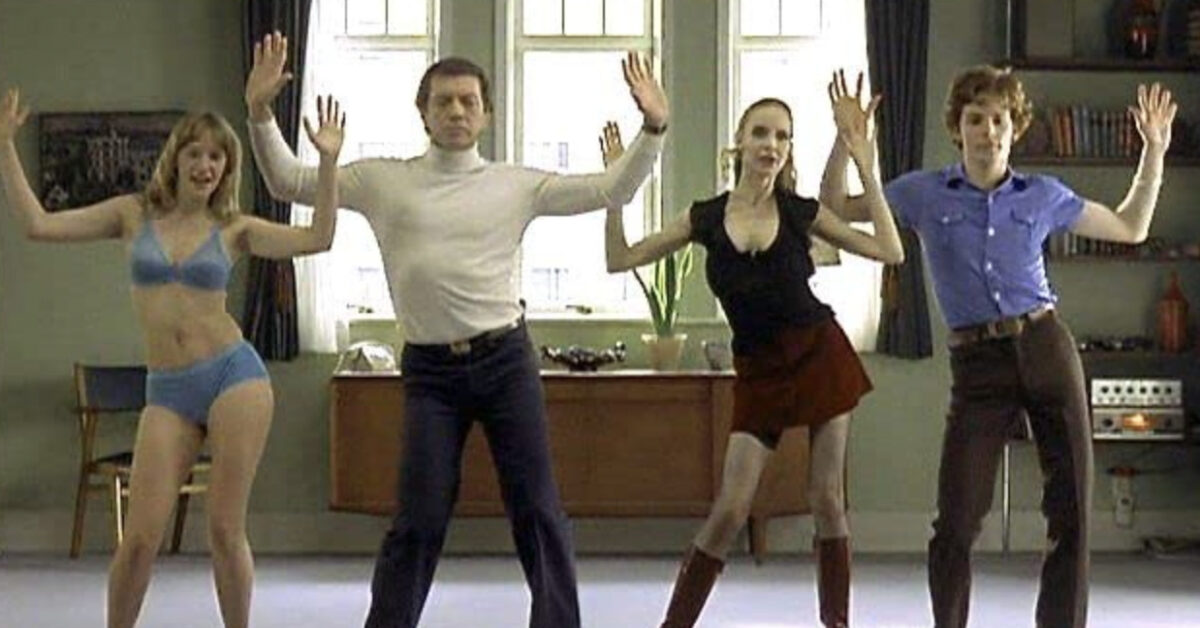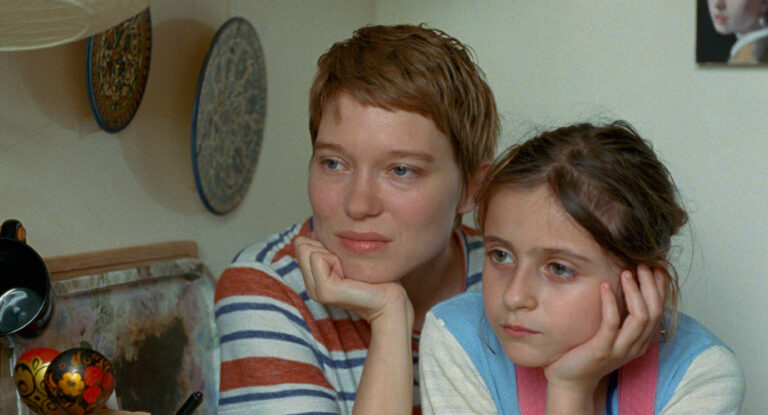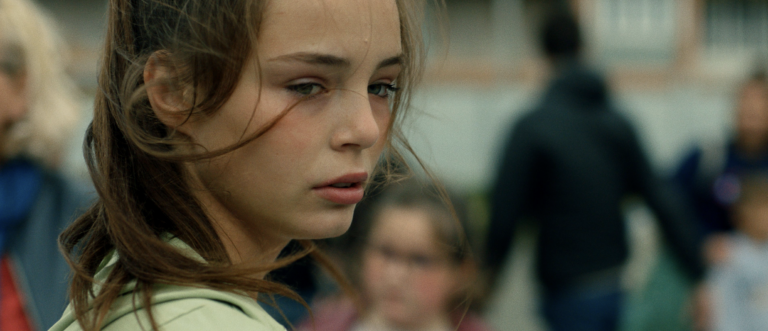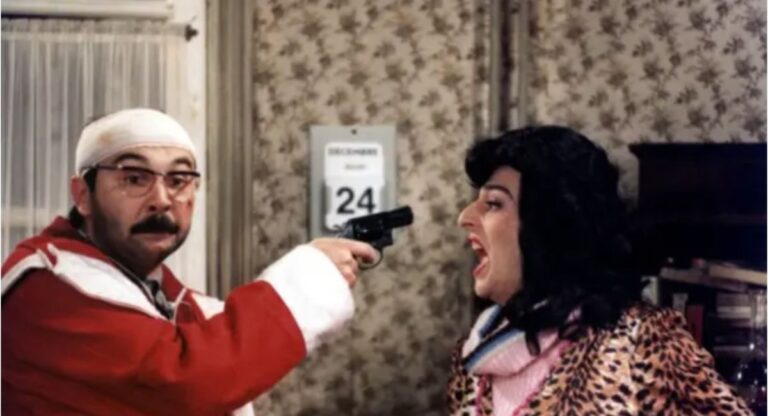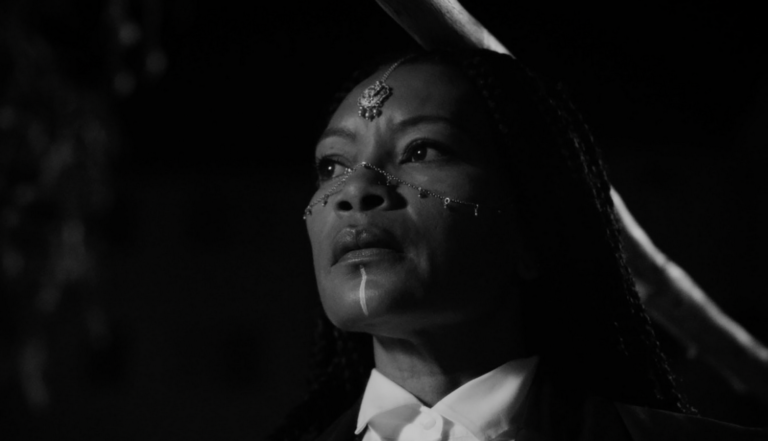You’ll always remember your first François Ozon film. My initial encounter with the director—whose audacious, wide-ranging oeuvre drips with camp, tension, sex, satire, naughty thrills, devastating chills, laugh-out-loud absurdity, haunting emotions, and uber-stylish visual panache—was the lean 52-minute See the Sea. The 1997 masterpiece of dread focuses on Sasha (Sasha Hails), a young British mother left alone with her baby daughter in their lovely house by the sea while her husband is away on business. When a backpacker (Marina de Van) asks to pitch her tent in the yard, Sasha makes vague excuses, and finally relents. She’s lonely, you see, and somehow drawn to the potentially dangerous stranger, whom she asks to watch her daughter for a short spell. When that goes alright, she invites her inside. A disquieting sense of menace hangs in the air, creeping under our skin and holding us hostage, unable to turn away from what can only be something horrible snaking through the grasses surrounding this lovely cottage on an island off the coast of France. All these years later, there are images (one involving a toothbrush) that I haven’t been able to scrub from my mind. The title alone still gives me chills.
Ozon began making provocative short films straight out of film school, one of which, A Summer Dress, was nominated for the 1996 César award for best short film. After that came See the Sea, followed by his debut feature, Sitcom (1998), a surreal social satire about a family that descends into total debauchery after adopting a rat. Since then, he’s averaged a movie a year. There’s no doubt Ozon is a creative force to be reckoned with.
The prolific auteur’s 2021 film, Everything Went Fine, opens in New York on April 14 and in LA on April 21, followed by a national rollout. The moving family drama tells the story of 85-year-old art collector André Bernheim (André Dussolier), who, after suffering a stroke, asks his daughter Emmanuèle (Sophie Marceau) to help him end his life. André is very clear about his wishes. “I want you to help me end it,” he says. But Emmanuèle resists, overwhelmed by the enormous responsibility he is placing on her. She enlists the help of her sister Pascale (Géraldine Pailhas), and the pair start doing their homework. Because assisted suicide is illegal in France, they will have to transport their father to a clinic in Switzerland in order to allow him the “death with dignity” he seeks, which requires jumping through a battery of ethical, legal, and logistical hoops. More complicated still is Emmanuèle’s struggle to come to terms with her father’s frequent cruelty from when she was a child, while preparing to let him go.
Everything Went Fine features excellent performances and compelling subject matter, but you won’t find the master’s darker, more scandalous proclivities here, the bold audacity generally associated with his work. If you’re inspired to explore some of the more daring (wackier, spicier, scarier) movies that put Ozon’s name on the map, I offer you a greatest hits sampler.
Criminal Lovers (1999)
In this twisted, Hansel and Gretel-inspired fairy tale, high school student Alice (Natacha Régnier) convinces her boyfriend, Luc (Jérémie Renier), to murder their classmate, Saïd (Salim Kechiouche). Lost in the woods after dumping his body, they stumble upon the cottage of a nasty old hunter (Serbian actor Miki Manojlovic), who forces Luc into bed with him and threatens to eat them. The film’s tagline was, “Their idea of foreplay was murder,” and one of its posters features a gigantic botanical penis.
Water Drops on Burning Rocks (2000)
The full loufoquerie of Ozon’s work is on display in this film adaptation of the play by one of Ozon’s greatest influences, the provocative German director, Rainer Werner Fassbinder. Taking place all in one room, the sex comedy/melodrama tells the tale of a sadistic businessman (Bernard Giraudeau), who seduces much younger lederhosen-clad man (Malik Zidi), then his fiancée (Ludivine Sagnier). One version of the film’s poster features the characters’ bare butts.
Under the Sand (2001)
Ozon never makes the same film twice. He followed the high camp of Water Drops with this melodrama inspired by All That Heaven Allows, which was directed by his other cinematic icon, Douglas Sirk (also a major influence on Fassbinder). Nominated for the César awards for best film, best director, and best actress, the film stars Charlotte Rampling as a woman haunted by the disappearance of her husband, who may or may not have drowned while they were on vacation in Les Landes.
8 Women (2002)
Ozon’s big, campy, old-Hollywood style musical comedy/murder mystery features an all-star cast that includes Catherine Deneuve, Isabelle Huppert, Emmanuelle Béart, Fanny Ardant, Virginie Ledoyen, Danielle Darrieux, Ludivine Sagnier, and Firmine Richard, eight women gathered for the holidays in a countryside manor, any of whom could be guilty when the man of the house turns up dead.
Swimming Pool (2003)
When British detective novelist, Sarah (Charlotte Rampling) shacks up at her publisher’s swanky house in the French countryside to work on her new book, she’s irritated at the arrival of his hot young daughter (Ludivine Sagnier). Fiction and reality begin to merge when a disturbing twist turns the writer’s stay into a thriller to rival the best of her books.
5×2 (2004)
Valeria Bruni Tedeschi and Stéphane Freiss star in this wrenching love story told in reverse, beginning with the couple’s divorce. Ozon said the structure was inspired by Jane Campion’s 1986 film, Two Friends. While the structure breaks from the norm, Ozon’s deep-dive into the relationship’s darkest moments shows the director’s capacity to mine deep emotional territory.
In the House (2012)
High school teacher Germain (Fabrice Luchini) becomes fascinated when his student, Claude (Ernst Umhauer) writes a disturbing story about a fellow student’s idyllic bourgeois family, with whom he’s obsessed. Germain’s encouragement leads Claude and the family he covets into dangerous territory. The social satire also stars Kristin Scott Thomas, Emmanuelle Seigner, and Denis Ménochet.
Everything Went Fine opens in New York on April 14 and in LA on April 21, followed by a national rollout.
Andrea Meyer has written creative treatments for commercial directors, a sex & the movies column for IFC, and a horror screenplay for MGM. Her first novel, Room for Love (St. Martin’s Press) is a romantic comedy based on an article she wrote for the New York Post, for which she pretended to look for a roommate as a ploy to meet men. A long-time film and entertainment journalist and former indieWIRE editor, Andrea has interviewed more actors and directors than she can remember. Her articles and essays have appeared in such publications as Elle, Glamour, Variety, Time Out NY, and the Boston Globe.

